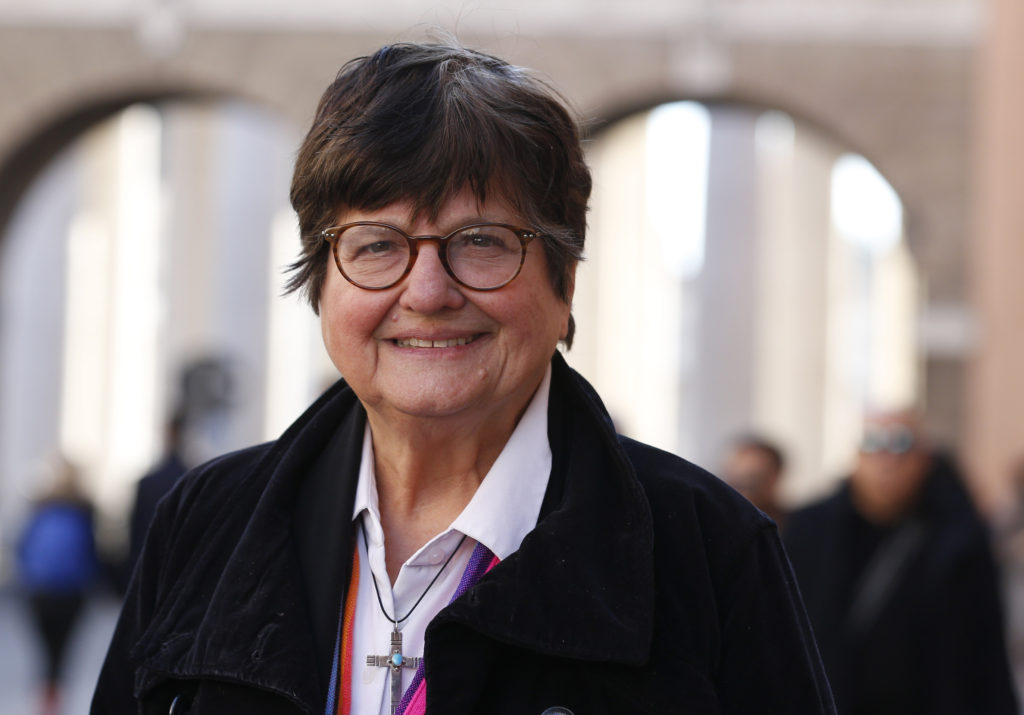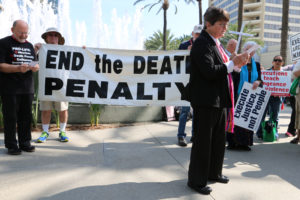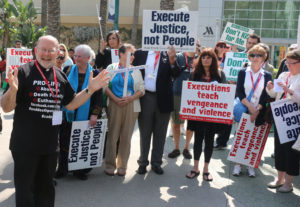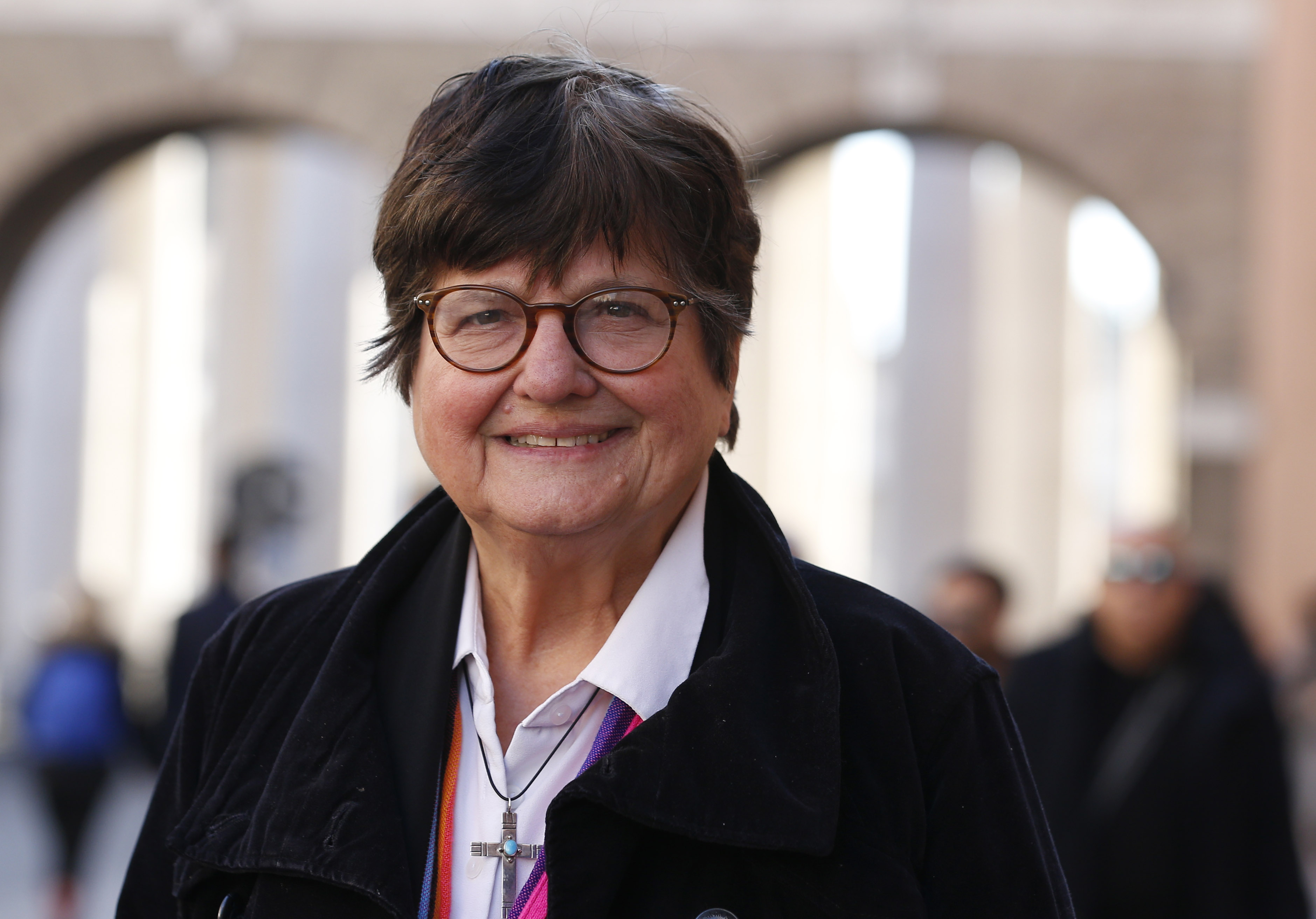
ANAHEIM, Calif. (CNS) — “They killed a man with fire one night. They strapped him in a wooden chair and pumped electricity through his body until he was dead,” Sr. Helen Prejean told an audience in Los Angeles Feb. 27.
“His killing was a legal act because he had killed. No religious leaders protested his killing that night,” she continued. “But I was there. I saw it with my own eyes. What I saw set my soul on fire, a fire that burns me still. And now here is an account of how I came to be and still am.”
With these words from a new book she is in the progress of writing, Sr. Helen began her keynote address on the second day of the 2016 Los Angeles Religious Education Congress.
And for the next hour-plus, the author of the 1993 best-seller “Dead Man Walking: An Eyewitness Account of the Death Penalty in the United States” explained how a shy self-spiritual-centered woman religious in her 40s became one of the nation’s outspoken voices against the death penalty.

“And I want to tell you, Jesus is sneaky,” she said in a Louisiana Cajun voice with a no-nonsense tone. But she still broke up the overflow crowd in the Anaheim Convention Center’s arena. “Jesus is sneaky,” she declared. “Jesus is sneaky. Put it on a T-shirt. Stick in the Bible. Watch out. Sneaky Jesus!”
The Sister of St. Joseph of Medaille said she’d been a comfortable suburban junior-high teacher when her community took a close look at its own mission in 1981. And the decision was to return to its French roots of ministering to society’s down-and-out. So she somewhat reluctantly moved into a housing project in New Orleans. “And my African-American neighbors began to teach me about the ‘other’ America,” she recalled. “And their stories broke my heart.”
Sticking with the new social justice line, the 40-something Sr. Helen naively agreed to become the pen pal of a killer on Louisiana’s infamous death row. And when he asked her to visit, she did. Soon she became his prison-registered “spiritual adviser.” She also started learning about how capital punishment was mostly applied to poor black men who had killed whites in Louisiana.
The religious sister witnessed the April 5, 1984, electric-chair execution her pen pal, who was white. “And watching his death, it changed my life,” she confided in a quieter voice. “He had done an unspeakable terrible crime. And that’s part of the spiritual journey, too. That’s the reason why he made me struggle. Others would say, ‘Look at what they did?'”
Patrick Sonnier, 27, and his younger brother Eddie, 20, were found guilty of the rape and murder of Loretta Ann Bourque, 18, and the murder of David LeBlanc, 17, at a lover’s lane Nov. 4, 1977, in St. Martin Parish, a Louisiana civil jurisdiction much like a county. Patrick got the death penalty and his brother was sentenced to life in prison; Eddie fell ill and died in prison Dec. 19, 2013, at age 57.
After Patrick’s execution, a prison vehicle brought Sister Helen back to the gate where sisters from her religious community were waiting. “I was so cold, they put a coat around me,” she said. “And I threw up. I’d never watched a human being get killed in front of my eyes. I don’t know what I’m gonna do about all this. I just know I’m throwing up in the middle of the night, and they just killed a man.”
But then she knew as clear as a bell. Most folks were never going to get close to a real execution. She had just witnessed one. So she had to tell the story. At first it was to any group that would listen. With a straight face, she talked about a nursing home where three brave seniors had shown up for her talk. But 10 minutes into her spiel, two were gone. Again the arena erupted in loud laughs.

Next Sr. Helen started writing about the post-midnight execution. Months later she had what she thought was a book, which an editor at Random House went about reshaping. Published in 1993, actress Susan Sarandon read The New York Times best-seller and really wanted to play her in a movie.
Working closely with Sarandon’s husband, actor and director Tim Robbins, the script went through five drafts. The result was the popular film “Dead Man Walking,” nominated for four Academy Award categories, including best picture. And Sarandon took home best actress.
Sr. Helen said the best part of doing the book and movie was meeting with both St. John Paul II and Pope Francis. She got their support against the death penalty as a crucial pro-life issue along with abortion and euthanasia.
“And we as Catholics now, we need to show our opposition to the death penalty,” urged Sr. Helen. “And we’re gonna lead and help California in this initiative campaign that will be on the ballot Nov. 1. But we need a whole lot of signatures. So sign that petition today and get others to act.
“Annunciations are frequent,” she added. “Inclinations are rare. God’s seed will come soon enough, and we will act on what we know to be right.”







